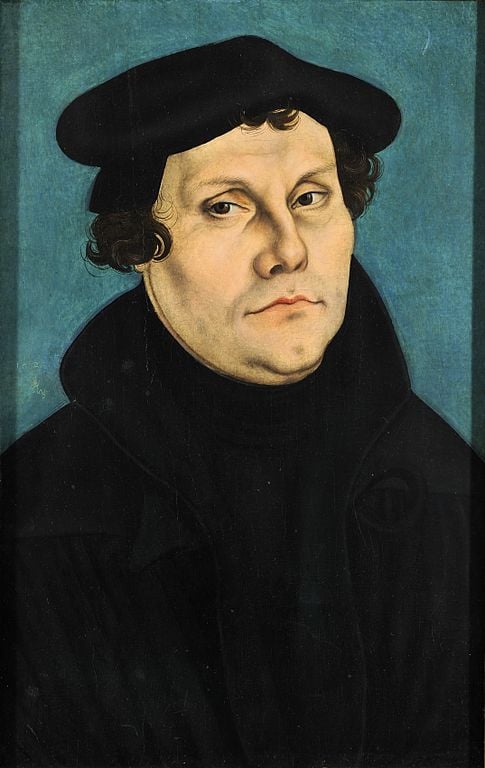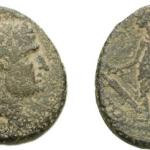He Still Refuses to Admit that Many Eminent Lutheran Scholars Contend that Luther Believed in Mary’s Immaculate Conception for His Entire Life

This has been an ongoing debate, going back literally over twenty years now. My initial wranglings with Reformed polemicist James Swan (who runs the Boors All blog) had to do with Luther’s Mariology. I refuted his contentions in great depth in two reply-articles, dated 4-26-03 and 6-28-03. Prior to June 2003 he had at least been outwardly cordial and civil in our interactions. But when I replied the second time within a few days of his presenting his huge paper, complete with 202 footnotes, it was too much for his anti-Catholic ego to stand, and he has treated me with the utmost contempt and dripping disdain and condescension (including serious accusations that I am supposedly severely mentally ill) ever since. See the boring details — if you have run out of things to do — in his section on my Anti-Catholicism web page.
I guess he thought it would take months for me to ever even make any attempt to offer a reply to his “magnum opus”: if I ever did at all. But I did very quickly. He still attempted to “debate” me till around 2010, at which point he ceased responding (while I continued offering rebuttals, and still do), according to the strategy also adopted in the same general time period by various other anti-Catholic luminaries, like James White, Jason Engwer, and Steve Hays (all of whom, like Swan, had extensively interacted with me prior to that time). “If you can’t beat ’em in argument, ignore them and pretend they don’t exist and flee for the hills” is the silly mentality.
Recently, Swan replied to Catholic apologist Trent Horn of Catholic Answers, in his article, “Catholic Answers on Luther’s View of the Immaculate Conception” (Boors All, 5-25-23). His words will be in blue.
Catholic Answers posted an article defending their belief that Mary was entirely without sin, particularly when detractors question the impregnation of a teenage girl. While Martin Luther’s view of the immaculate conception was only a passing comment, it represents a change in typical Roman Catholic cyber-treatments of the Reformer’s Mariology. Apologist Trent Horn writes,
Some Protestants might say that at best, this proves only that Mary was free from sin at the Annunciation, not necessarily since her conception. Martin Luther, for example, moved away from belief in the Immaculate Conception, but even in 1540, he said with regard to the Annunciation, “The flesh and blood of Mary were entirely purged, so that nothing of sin remained.” In response, I would just say that it seems arbitrary to say God chose this moment to give Mary grace rather than at any other moment and that the angel’s greeting, “Hail, full of grace,” signifies that her being full of grace was a part of her identity even before the announcement about the Incarnation.
Luther continued (most of the time) to assert that Mary was without actual sin, and that she was freed from original sin (the latter being the most constant aspect of his evolving beliefs on the matter). Since those are the two essential elements of the Immaculate Conception (and vastly different from the opinions of almost all Protestants today), then we are quite justified in continuing to say that he held the doctrine “in some form” (as I expressed it in my 2003 paper) until his death: he held to Immaculate Purification. It’s not identical to the Catholic position (which wasn’t yet a dogma during his lifetime, anyway, so that folks were free to disagree a bit), but it is far closer to the Catholic position than any denominational or creedal Protestant position today. . . . I have argued that the substance or essence of Luther’s views remained the same, insofar as he held that Mary was purified of original sin. That didn’t change. That’s the essence of the immaculate conception. When it happened is a different issue, but not of its essence.
Yes: 31 (16 Lutherans, 13 Catholics, 1 Reformed, 1 probably Protestant [uncertain] )
Probably: 1 (Catholic)
Probably not: 1 (Catholic)
No: 2 (1 Catholic; 1 Lutheran)
That makes for an 89% rate of scholars of various religious persuasions. Only one Protestant scholar is firmly against the opinion, while two Catholic scholars are against and probably against (putting to rest the charge of denominational bias and special pleading). The Lutheran scholars can be, I think, fully trusted for the interpretation of the founder of their branch of Christianity. Catholic scholars are, then, only agreeing with the consensus of Lutheran scholarship on this point.
As already noted, I myself agree with Swan that later Luther appeared to change his mind (thus, I can’t be accused of bias on this topic). But the issue is whether only Catholic scholars and apologists believe that Luther maintained the same opinion his entire life. Many Lutheran scholars also hold to that. They may be right in the end, for all I know. Interpreting Luther in his endless vacillations and polemical moods and self-contradictions is always difficult. I drew my own conclusion based on the relevant data that I had found. But I’m not a Luther scholar, so I may be wrong in the final analysis. And if I am shown to be, I’ll be more than happy to change my opinion again, since I want to believe in truth, not falsehood.
The Lutherans holding to this view that Swan implies only ignorant, misinformed Catholic polemicists adhere to include some very big names. I wrote:
[T]he eminent Lutheran scholar Eric W. Gritsch, who studied for his doctorate under the famous Luther biographer Roland H. Bainton, and was a major translator of Luther’s Works in English (edited by Jaroslav Pelikan), including the lengthy treatise, Against the Roman Papacy: An Institution of the Devil (vol. 41, 263-376). He wrote:
Luther defended Mary’s perpetual virginity and regarded her Immaculate Conception as “a pious and pleasing thought” that should not, however, be imposed on the faithful. (in The One Mediator, the Saints, and Mary, Lutherans and Catholics in Dialogue VIII, edited by H. George Anderson, J. Francis Stafford, Joseph A. Burgess, Minneapolis: Augsburg Fortress Press, 1992; 241)
In footnote 43 on page 382, he elaborated:
‘Haec pia cogitatio et placet.’ Exposition of the Ninth Chapter of Isaiah, 1543/44. WA 40/3:680.31-32. Two scholars doubt whether Luther affirmed the doctrine of the Immaculate Conception of Mary: Preuss (n. 11 above came to the conclusion that Luther rejected the doctrine after 1528; O’Meara states that “it is likely, but not certain” that Luther rejected the doctrine (118 [n. 11 above]). But Tappolet (32 [n. 1 above]) demonstrated with the use of texts that Luther did not change his mind. The literary evidence from Luther’s works clearly supports the view that Luther affirmed the doctrine, but did not consider it necessary to impose it.
Walter Tappolet is “the man” as far as documenting Luther’s Mariology. Gritsch writes about him on page 379:
An exhaustive collection of Luther’s statements on Mary has been offered by Walter Tappolet and Albert Ebneter (eds.), Das Marienlob der Reformatoren (Tubingen: Katzmann, 1962), 17-218, 357-64. Two studies have analyzed the chronological development of Luther’s views in conjunction with his basic theological views: Hans Dufel, Luthers Stellung zur Marienverehrung ( . . . 1968) and William J. Cole, “Was Luther a Devotee of Mary?” Marian Studies 21, (1970), 94-202) . . .
The doctrine of the Immaculate Conception, which Pius IX., in our own days, first ventured to raise into a dogma of the Church, was zealously defended by the Augustinians, and firmly maintained by Luther himself, even after the beginning of his war of Reformation.
Many (if not most) of Rome’s defenders are self-proclaimed Roman Catholic apologists: the Pope has not sanctioned them to venture into cyberspace and tap away on their keyboards to defend the Roman church. Therefore, if you are engaging in a dialog with a defender of Rome, you are not necessarily doing apologetics against Roman Catholicism, but rather, an interpretation of Roman Catholicism. Whenever possible, ask Rome’s defenders to document their points with official dogmatic pronouncements from the magisterium. . . . Similarly with history: say a defender of Rome makes a declaration about Martin Luther, make sure to inquire if it’s their opinion, or an official historical conclusion of the Magisterium.
Trent Horn has plenty of credentials, as shown, He works for Catholic Answers: the largest and arguably the most influential Catholic apologetics organization in the world, these past thirty years. It has massive oversight from many bishops, as I have written about in the past (because anti-Catholics constantly bring up this pseudo-issue). They, in turn, are under the pope.
Practical Matters: Perhaps some of my 4,300+ free online articles (the most comprehensive “one-stop” Catholic apologetics site) or fifty-three books have helped you (by God’s grace) to decide to become Catholic or to return to the Church, or better understand some doctrines and why we believe them.
Or you may believe my work is worthy to support for the purpose of apologetics and evangelism in general. If so, please seriously consider a much-needed financial contribution. I’m always in need of more funds: especially monthly support. “The laborer is worthy of his wages” (1 Tim 5:18, NKJV). 1 December 2021 was my 20th anniversary as a full-time Catholic apologist, and February 2022 marked the 25th anniversary of my blog.
PayPal donations are the easiest: just send to my email address: [email protected]. You’ll see the term “Catholic Used Book Service”, which is my old side-business. To learn about the different methods of contributing, including 100% tax deduction, etc., see my page: About Catholic Apologist Dave Armstrong / Donation Information. Thanks a million from the bottom of my heart!
***
Photo credit: Portrait of Martin Luther (1528), by Lucas Cranach the Elder (1472-1553) [public domain / Wikimedia Commons]
***
Summary: I document the continuing biased presentations of anti-Catholic polemicist James Swan regarding Luther’s view of the doctrine of Mary’s Immaculate Conception.

















